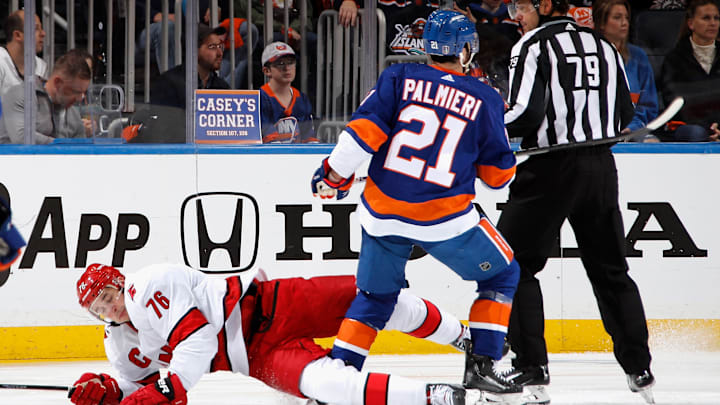MINUS
I'm not going to talk about his goalscoring trouble in 2020 and 2021, because as I said, those seem to be over thanks to regression to the mean. I'm also not going to complain that he doesn't get a ton of assists - this team has plenty of playmakers, someone who can score the puck is very valuable. Pretty much all the negative things I have to say about Palmieri boil down to one thing: He has trouble staying healthy.
I said that Palms scored at a 24-goal pace this season. That's true, but it's also a little misleading. He scored 16 goals in 55 games, and if he had played the rest of the season at that pace, he would have scored 24 goals. But those extra nine goals didn't really happen, did they?
This isn't an isolated incident, either. Palmieri hasn't played 80 games in a season since 2016-17, and has only even reached 70 once. That's slightly unfair - in the COVID-shortened seasons, he didn't miss any significant time. But since joining the Islanders, he's missed extended periods of both seasons - in 2021-22, a "day-to-day" injury would up lasting over a month, and in 2022-23, he missed a month, then got hurt in his first game back and missed another month.
Palmieri isn't old, per se, but at 32, he's old enough that consistent injury trouble should be concerning. There's always a caveat with a player like that. "He was playing really well - until the injury" or "he should score 30 goals - if he can stay healthy".
That's the only reason his contract is worrying. Yes, the only reason. For a 24-30 goal scorer, which Palmieri is when healthy, $5 million is perfectly reasonable. That's the same amount of money as Dylan Strome (23 goals), Rickard Rakell (28 goals), Jonathan Marchessault (28), Reilly Smith (26), Ivan Barbashev (16), Ryan Strome (15), and Joel Farabee (15), and only slightly more money than Drake Batherson (22), Blake Coleman (18), and David Perron (24). All of those goal totals are from seasons of at least 75 games.
So, if he stays healthy, I have absolutely no problem paying Palmieri $5 million. In today's NHL, especially with the flat cap finally behind us, a 25-goal scorer is worth that. But if he keeps missing time with injuries, the contract starts looking worse and worse. One injury is fine - hockey is a tough sport, people get hurt, it happens. But three medium-term injuries over the last two seasons brings up a possible concern that we'll be paying Palmieri $5 million to sit in the press box.
That's a risk you take with every large contract, of course - if Mat Barzal or Ilya Sorokin got hurt longterm, it'd be equally bad (actually, much worse). But the likelihood of a serious injury seems higher for Palmieri, given his age and recent injury history.
In summary - Kyle Palmieri is a very good hockey player. If he can stay healthy, he should continue to be a productive offensive winger, scoring 25-30 goals per year. If not, then he could be a waste of $5 million.
